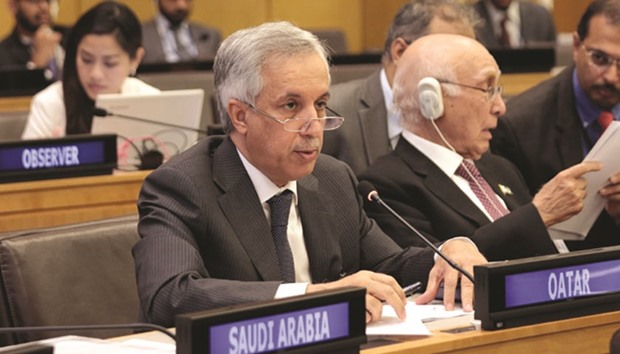Qatar spares no effort to help brotherly Muslim countries achieve national reconciliation, Minister of State for Foreign Affairs HE Sultan bin Saad al-Muraikhi said here.
Al-Muraikhi referred to HH the Emir Sheikh Tamim bin Hamad al-Thani’ s efforts, which led to the resolution of the border conflict between Djibouti and Eritrea, achieving a fair and peaceful settlement based on the principles of good neighbourliness and mutual respect for the territorial integrity and sovereignty within the internationally recognised borders and the release of all Djibouti’s prisoners of war.
He was speaking at the Annual Co-ordination Meeting (ACM) of the foreign ministers of the Organisation of Islamic Co-operation (OIC) nations held on the sidelines of the 71st session of the United Nations General Assembly (UNGA) in New York.
The Minister of State for Foreign Affairs said Palestine, in particular Al Quds, was the central issue for the Islamic nation, so the lack of a solution to the Palestinian cause was the main challenge not only to the Muslim countries but also the whole world.
The continued Israeli occupation, settlement policy and the blockade imposed on the Gaza Strip along with other violations and practices against the Palestinian people constitute a major obstacle to achieving a just and comprehensive peace in the Middle East and represent a flagrant violation of international law, international humanitarian law and the resolutions of international legitimacy, he said.
Al-Muraikhi drew attention to the grave attacks and violations against the holy sites and places in Al Quds, urging the Islamic nation to protect and preserve them from the Israeli attacks based on international law and “by keeping the Al Quds issue always present in our consciousness, the Muslim media’s discourse and all international forums.”
The Islamic nation will remind the international community that the Israeli measures in East Jerusalem, including the Al Aqsa Mosque, are null and have no legal effect, he said.
The Syrian crisis represents another grave challenge for the Islamic nation, al-Muraikhi said, noting that the Syrian people endure an ‘unprecedented ‘ suffering and the number of victims has reached nearly half a million with millions of internally displaced and refugees in addition to the serious effects of terrorism on Syria and the region resulting of the systematic Syrian regime’s policy focused on imposing a blockade on civilians, depriving them of the most basic necessities of life, adopting a forced displacement to implement a demographic plan based on sectarian and security grounds, and using of all kinds of weapons against civilians, including chemical weapons.
The Minister of State for Foreign Affairs urged the OIC to take a strong position to support the Syrian people, put an end to their long suffering, and support international efforts to reach a political solution in accordance with the Geneva I Communique in order to preserve Syria’s unity, independence, sovereignty and territorial integrity.
He referred in this regard to Qatar’s continuous efforts to provide humanitarian assistance to the Syrian people, stressing that Qatar exerts all efforts to reach a political solution to the Syrian crisis and enhance security and stability in the region as well.
“Qatar continues supporting our brothers in Yemen to restore stability,” al-Muraikhi said, reiterating that the solution for Yemen’s crisis will be achieved based on national consensus incorporating the GCC initiative, outcomes of national dialogue conference, the UN Security Council Resolution 2216 and the relevant Security Council resolutions.
Empowering and supporting Libya’s Government of National Accord are the key factors to restoring security and stability in that country, countering terrorism and dealing with its effects, al-Muraikhi said.
He warned against outside intervention in Libyan affairs, which would increase the complexity of the crisis and impede progress to achieve national consensus.
Al-Muraikhi spoke of the continuous suffering of the abducted Qatari citizens in Iraq and their families since entering the Iraqi territory legally in December last year with the co-ordination of the competent Iraqi authorities.
In light of the humanitarian nature of this issue and considering that kidnapping is a terrorist act, a flagrant violation of international law and human rights, which is contrary to the provisions of the Islamic religion, “we hope for the release of the Qataris and their safe return to their homeland and their families as soon as possible,” al-Muraikhi said.

Al-Muraikhi speaks at the annual Co-ordination Meeting (ACM) of the foreign ministers of the Organisation of Islamic Co-operation (OIC) nations.
